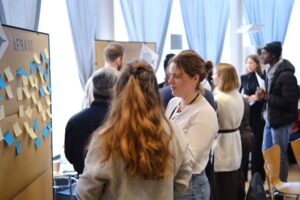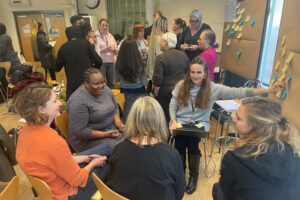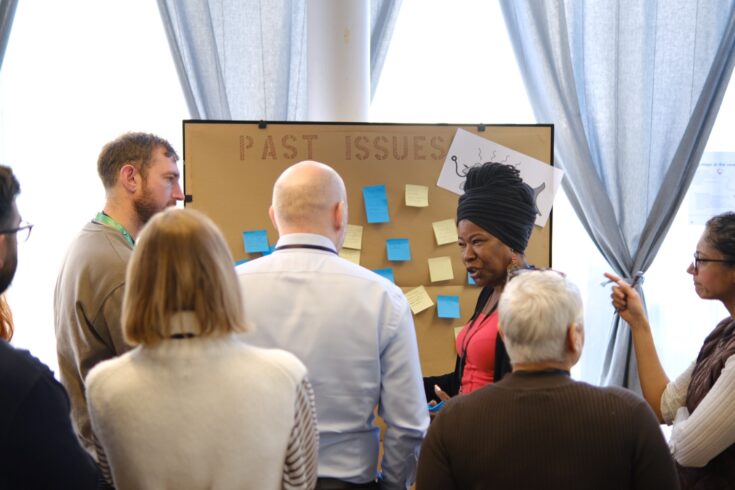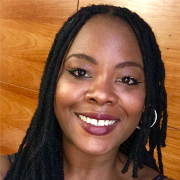When I was asked if I would like to be part of co-developing the Medical Research Council (MRC) public partnerships strategy it was an easy yes. It’s so important that diverse voices are included in initiatives that are driven by what I often refer to as ‘dominant’ institutions. These are influential health research organisations who hold the majority of power in research.
Our mission for equitable partnership for research
Inclusivity is essential for equitable health research. This is a principle close to my heart personally. We are a community-based organisation in South London called Mabadiliko. Driving equitable community partnership in health research is central to our work and mission.

Attendees at 2023 Mabadiliko event discussing what equitable partnership in health research means for South East London. Credit: Kirk Richards
MRC is funded by public money to support research to improve human health. The research they fund and deliver can, for instance, help inform and improve healthcare services. It is also well documented that health influences, and is impacted by, wider societal factors. Therefore, the work of MRC directly impacts people’s day-to-day lives in very profound ways. It’s important that people who are impacted are also included in key decision-making.
Inequity in health research is not acceptable
Much of my focus, on ensuring that equity is embedded into research as normal practice, comes from my personal lived experience as part of the second generation of Windrush. I look back to the experiences of my grandparents and parents through a generational lens to see how inequality impacts every facet of life.
Our communities, my community, and other communities that are under-served, are still being disproportionately harmed by or dying from preventable health conditions. It’s not acceptable.
Through my work, I’m often asked to speak to communities to understand why they do or do not perform ‘desired’ health behaviours. This includes taking up treatment options that are preferred by the clinical community, for example medications. But in my opinion, it is equally, if not more important, to also hold the mirror up to the health system to interrogate their role in this generational inequality. I am proud to work with system partners every day on this journey.

Attendees in a discussion group at 2023 Mabadiliko event. Credit: Kirk Richards
I was raised by an incredible social activist, my mother Hillna Fontaine, who founded Mabadiliko. She has afforded me the privilege of an educational route which has granted me access to spaces where power is held and decisions are made with respect to health and health research. She has also provided me a platform to use my voice. It is important that I do this wherever I can.
My role in co-developing the strategy
I was part of an External Advisory Group (EAG), which had 10 external partners. Overall, I attended four sessions. These were facilitated by an external supplier, Vocal, who were commissioned to gather insights, suggestions and views about future MRC priorities for their public partnerships strategy.
In the first session we reviewed documents and information from MRC around this emerging strategy. It was really good that we had a space without MRC colleagues to share, think, debate and plan for our approach when we were all together.
The second meeting was a workshop with MRC colleagues where we discussed the scope and priorities for the new strategy. At later meetings MRC colleagues brought a draft strategy for discussion. My perception was that the objective of the session was to focus on the tactical elements; the words, the strategy and the actions. Actually, the group focused much more on culture, scale of change, bravery, confidence and the human element of change.
Encouraging personal reflection
We invited them to give personal reflections on how they were finding the co-development process, which I hope was helpful but may have been unexpected by MRC colleagues.
We asked questions like:
To what extent do you personally feel aligned to this? To what degree do you understand whether your wider colleagues feel aligned with this? What might changing the status quo for power-sharing mean for you personally? Your own professional or personal identities?
The conversation was somewhat awkward and uncomfortable, but in my experience, these conversations often start this way. And I think that collectively we moved through that. I was proud of both my EAG and MRC colleagues for this. Focusing on feelings can be hard to do when we are often driven by the facts.
Pushing the ambition
We had lots of good debates around who is (and isn’t) included in the research system as a respected partner. We shed some light on the world outside of ‘dominant’ institutions like UK Research and Innovation, for instance the perspective of community-based researchers. We all know our little worlds and don’t always know what’s outside. I’d like to think that we helped push the ambition and provide constructive challenge.
For the final session, I think most of the EAG left feeling like there is probably room for improvement and opportunity for more ambition. But we overwhelmingly felt that we could see that MRC colleagues had listened and acted on several of our main reflections and recommendations. I don’t always see that in the work that I do.
Recognise your individual power
Often when I work with colleagues in the health and research system, they feel paralysed about the scale of change and do not know where to start. Sometimes this results in a hope or assumption that these challenges can be solved at organisational or institutional levels, for example through strategies.
But I want to encourage us all to remember that power sits within us as individuals also. All of us. We can all do something, however small, every day, to help push the collective effort towards equity in health research and health services.
Find out more
In 2022 MRC commissioned a review of public involvement in research, with a specific focus on non-clinical health and biomedical research. The review explored public involvement culture and practice within MRC and the external research landscape. The recommendations from this review formed the basis for the co-development of the MRC strategy.
In 2023, MRC held a series of co-development workshops with stakeholders, including public partners, researchers, funders and public involvement and engagement professionals. You can read more about this process on Vocal’s blog. A public consultation in January 2024 invited everyone to give their views on the draft MRC public partnerships strategy. The final strategy will launch in summer 2024.




